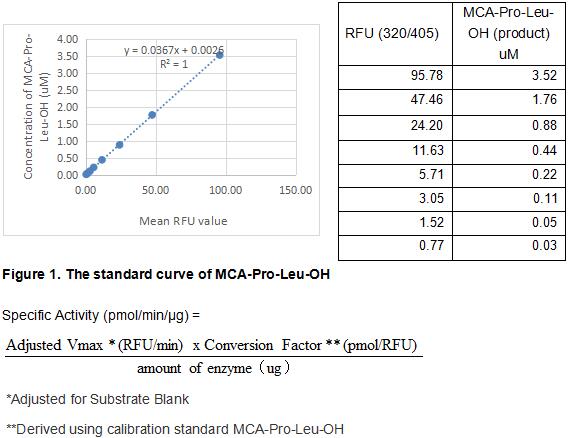Active Cathepsin D (CTSD)
CPSD; CLN10; Lysosomal Aspartyl Protease; Ceroid-Lipofuscinosis,Neuronal 10
- Product No.UAPB280Hu62
- Organism SpeciesHomo sapiens (Human) Same name, Different species.
- Buffer FormulationPBS, pH7.4, containing 5% Trehalose.
- TraitsFreeze-dried powder
- Purity> 90%
- Isoelectric Point6.5
- ApplicationsCell culture; Activity Assays.
- Download Instruction Manual
- UOM 10µg50µg 200µg 1mg 5mg
-
FOB
US$ 169
For more details, please contact local distributors!US$ 423
For more details, please contact local distributors! US$ 845
For more details, please contact local distributors! US$ 2535
For more details, please contact local distributors! US$ 6338
For more details, please contact local distributors!
ACTIVITY TEST of the Active Cathepsin D (CTSD)

Cathepsin D is a lysosomal aspartic protease of the pepsin family. Human cathepsin D is synthesized as a precursor protein, consisting of a signal peptide (residues 1 18), a propeptide (residues 19 64), and a mature chain (residues 65 412). The mature chain can be processed further to the light (residues 65 161) and heavy (residues 169 412) chains. It is expressed in most cells and overexpressed in breast cancer cells. It is a major enzyme in protein degradation in lysosomes, and also involved in the presentation of antigenic peptides. Mice deficient in this enzyme showed a progressive atrophy of the intestinal mucosa, a massive destruction of lymphoid organs, and a profound neuronal ceroid lipofucinosis, indicating that cathepsin D is essential for proteolysis of proteins regulating cell growth and tissue homeostasis. The activity of recombinant human CTSD is measured by its ability to cleave a fluorogenic peptide substrate MCA-Pro-Leu-Gly-Leu-DPA-Ala-Arg-NH2 in the assay buffer 0.1 M NaOAc, 0.2 M NaCl, pH 3.5. The rhCTSD is diluted to 20 ug/ml in assay buffer, then incubated at 37 °C for 30min. The incubated rhCTSD is diluted to 5 ug/mL in assay buffer. Loading into a black well plate 50 µL of 5 ug/mL rhCTSD and start the reaction by adding 50 µL of 60 µM substrate, with a substrate blank containing 50 µL assay buffer, 50 µL substrate, and no rhCTSD. Then read at excitiation and emission wavelengths of 320 nm and 405 nm, respectively, in kinetic mode for 5 minutes. The specific activity of recombinant human CTSD is > 675 pmol/min/µg.
USAGE of the Active Cathepsin D (CTSD)
Reconstitute in 10mM PBS (pH7.4) to a concentration of 0.1-1.0 mg/mL. Do not vortex.
STORAGE of the Active Cathepsin D (CTSD)
Avoid repeated freeze/thaw cycles. Store at 2-8°C for one month. Aliquot and store at -80°C for 12 months.
STABILITY of the Active Cathepsin D (CTSD)
The thermal stability is described by the loss rate. The loss rate was determined by accelerated thermal degradation test, that is, incubate the protein at 37°C for 48h, and no obvious degradation and precipitation were observed. The loss rate is less than 5% within the expiration date under appropriate storage condition.
INCREMENT SERVICES
BCA Protein Quantification Kit
Molecular Mass Marker for Protein
Monoclonal Antibody Customized Service
Polyclonal Antibody Customized Service
Protein Activity Test Experiment Service
Electrophoretic Mobility Shift Assay (EMSA) Experiment Service
Buffer
Lentivirus Packaging Experiment Service
Adenovirus Packaging Experiment Service
Real Time PCR Experimental Service
Spike RBD Protein (S-RBD)
Protein G
Protein A
Related products
| Catalog No. | Organism species: Homo sapiens (Human) | Applications (RESEARCH USE ONLY!) |
| UAPB280Hu61 | Active Cathepsin D (CTSD) | Cell culture; Activity Assays. |
| UEPB280Hu61 | Eukaryotic Cathepsin D (CTSD) | Positive Control; Immunogen; SDS-PAGE; WB. |
| URPB280Hu01 | Recombinant Cathepsin D (CTSD) | Positive Control; Immunogen; SDS-PAGE; WB. |
| UAPB280Hu62 | Active Cathepsin D (CTSD) | Cell culture; Activity Assays. |
| UEPB280Hu62 | Eukaryotic Cathepsin D (CTSD) | Positive Control; Immunogen; SDS-PAGE; WB. |
| URPB280Hu02 | Recombinant Cathepsin D (CTSD) | Positive Control; Immunogen; SDS-PAGE; WB. |
| URPB280Hu03 | Recombinant Cathepsin D (CTSD) | Positive Control; Immunogen; SDS-PAGE; WB. |
| URPB280Hu04 | Recombinant Cathepsin D (CTSD) | Positive Control; Immunogen; SDS-PAGE; WB. |
| UPAB280Hu02 | Polyclonal Antibody to Cathepsin D (CTSD) | IHC; ICC/IF |
| UPAB280Hu01 | Polyclonal Antibody to Cathepsin D (CTSD) | WB; IHC |
| ULAB280Hu71 | Biotin-Linked Polyclonal Antibody to Cathepsin D (CTSD) | WB; IHC; ICC. |
| UMAB280Hu21 | Monoclonal Antibody to Cathepsin D (CTSD) | ICC/IF |
| UMAB280Hu26 | Monoclonal Antibody to Cathepsin D (CTSD) | WB |
| UMAB280Hu22 | Monoclonal Antibody to Cathepsin D (CTSD) | WB; IHC; ICC/IF |
| UFAB280Hu02 | Anti-Cathepsin D (CTSD) Monoclonal Antibody | Flow cytometry. |
| USEB280Hu | ELISA Kit for Cathepsin D (CTSD) | Enzyme-linked immunosorbent assay for Antigen Detection. |
| UHEB280Hu | High Sensitive ELISA Kit for Cathepsin D (CTSD) | Enzyme-linked immunosorbent assay for Antigen Detection. |
| ULMB280Hu | Multiplex Assay Kit for Cathepsin D (CTSD) ,etc. by FLIA (Flow Luminescence Immunoassay) | FLIA Kit for Antigen Detection. |



